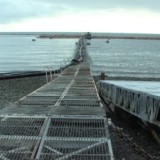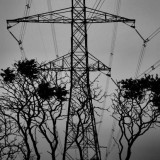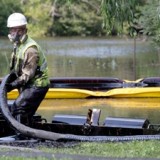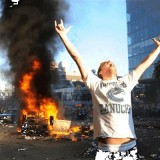Read this article by Rex Weyler on the Post Carbon Institute’s Energy Bulletin on seven reasons why nuclear power isn’t a solution to climate change. (July 19, 2011)
Category Archives: Uncategorized

Shades of Green: ISA – A Ticking Time Bomb
The Infectious Salmon Anemia virus (ISAv) is a ticking time bomb that could explode under BC’s salmon farming industry and their open net-pens. If this industry has imported such a disease into the ecology of the Pacific Northwest via infected Atlantic salmon material, the results could be an ecological catastrophe. Whatever remains of the industry’s besieged environmental reputation would be ruined, as would any vestige of confidence in the Department of Fisheries and Oceans (DFO).
But the real and lasting damage would be to Pacific wild salmon, together with the entire West Coast marine ecology and culture that depends on them. ISAv could dwarf sea lice as a scourge because it would be a persistent threat to the health of all wild salmon and herring – once established, the disease would be intractable and permanent.
ISAv was first detected in Norwegian salmon farms in 1984. It existed previously in Norwegian rivers as a benign infection that did not kill salmon. However, in a change that biologists call a “stochastic event”, it mutated to become lethal – probably in fish farms “because there is no reason for it to live lightly in fish destined for slaughter” (alexandramorton.typepad.com/). The lethal version was then carried with Atlantic salmon brood stock to salmon farm hatcheries where it was distributed by the industry throughout the North Atlantic and overseas to Canada and Chile – its arrival in Chile in 2007 nearly decimated the country’s entire salmon farming industry.
The first evidence of ISAv’s arrival in Canada was in New Brunswick salmon farms in 1996. In 1998, the Friends of Clayoquot Sound were expressing concern about its arrival in BC. In January of 2009, David Suzuki, Chief Bob Chamberlin, Professor Larry Dill, Alexandra Morton and over 100 other concerned citizens wrote a letter to the Premier of British Columbia, requesting “that B.C. immediately prohibit the importation of live farm salmon material (all species of broodstock, milt and eggs) to protect BC from the spread of Infectious Salmon Anemia.”
In June 2009, Alexandra Morton wrote another letter of concern. “I am not hearing how the [salmon farming] industry can possibly safeguard British Columbia from contamination with their ISA virus. Infectious Salmon Anemia is a salmon virus that is spreading worldwide, wherever there are salmon farms.” She highlighted her concern with the authoritative prediction of Professor Are Nylund, head of the Fish Diseases Group at the University of Bergen, Norway. He warned that, “based on 20 years of experience, I can guarantee that if British Columbia continues to import salmon eggs from the eastern Atlantic, infectious salmon diseases, such as ISA, will arrive in Western Canada.”
The inevitable may now be the reality. At least two media outlets, The Tyee and Pacific Free Press, have reported the possibility that ISAv is in BC marine waters. The Globe & Mail (May 03/11) reported that “there are approximately 35 indications of the existence of ISA identified in [the Cohen Commission] records to date” and that these records contain “information showing provincial inspectors found signs of a disease, infectious salmon anemia, or ISA, had been detected in British Columbia.”
The salmon farming industry is certain that ISAv has not reached the West Coast because high mortality in its pens would be an obvious indicator. But such mortality would not occur with the difficult-to-detect non-lethal form of ISAv (Ibid.). And DFO, in concert with the industry’s position, has repeatedly assured concerned British Columbians that regulations are in place to prevent ISAv from reaching the West Coast. Given DFO’s overtly supportive relationship with the salmon farming industry, however, Morton decided to “ground truth” this assurance. She found “that at every location where they could have caught ISAv there was a gaping hole…. except where trade sanctions loomed, then the proper documentation surfaces” (Ibid.).
If Plan A fails, will Plan B work? Even if ISAv is brought to the West Coast with farmed Atlantic salmon, Pacific salmon are supposed to be immune to the disease ‹ supposed to be. But as every biologist knows, and as ISAv has already demonstrated in Norway, such viral diseases are mutational acrobats. Wild Pacific species would be an irresistible opportunity that ISAv could reach simply by mutating. The result would be an unmitigated disaster for everything from ecology to culture associated with BC’s iconic wild salmon. Morton writes that she has found Broughton Archipelago herring with the symptomatic ISAv bleeding around their fins but has been unable to get a laboratory to test the samples (Ibid.).
Meanwhile, the Cohen Commission’s inquiry grinds on. From August 25th to September 9th, 2011, it will examine the relationship between disappearing Fraser River Sockeye, West Coast salmon farming and the gauntlet of open net-pens that wild smolts have to pass on their out-migration to the sea.
The salmon farming industry, meanwhile, has been doing its legal best to prevent the release of privileged information it has been forced to divulge to the Commission, arguing that this release to the public could cause them “reputational and economic damage”. The public availability of such confidential information previously hidden from open environmental scrutiny, it contends, would create a “media circus”.
“Media circus” is the industry’s term for losing control of a public relations agenda that for decades has been construing conspicuously damaging environmental practices as harmless. ISAv could blast that benign image out of West Coast waters. Indeed, a whole minefield of bombs are ticking under the industry’s open net-pens.
Suitcases of Cash Banned by International Whaling Commission
Read this report from ABC (Australia) news on the IWC’s approval of a ban on bringing suitcases of cash to negotiations, in an effort to curb the votes-for-cash corruption that has plagued the organization’s annual meetings. (July 14, 2011)

Musgamagw Unite in Response to Marine Harvest Breach
It’s the latest chapter in a long and increasingly heated battle between BC’s coastal First Nations and the Norwegian salmon farmers that operate in their waters. The Musgamagw-Tsawataineuk peoples of the Broughton Archipelago recently gathered in the village of Gwayasdums in response to a serious breach of protocol by Marine Harvest, the largest open net cage fish farm operator in the region. On June 27, the company made an unauthorized boat trip through the territory, using elders to gather valuable information about the history and cultural sites of the area – underhanded tactics that take place amidst a high-stakes legal battle between the aquaculture industry and these same First Nations. Hereditary and elected leaders, matriarchs and community members emerged from the meeting in Gwayasdums united, with renewed resolve to rid their territory of open net cage salmon farms.
The Tyee on Kai Nagata’s “Why-I-Quit-TV-Journalism” Manifesto
Read this republication by the Tyee of recently retired CTV Quebec bureau chief Kai Nagata’s account of why he quit the business – a story that has become a lightning rod for heated discussion about the state of Canada’s mainstream media in recent days.

Shades of Green: Anthropogenesis – A Redefining of Ourselves
Our human history has been a long process of taking greater control of the circumstances that affect us. Our early shelters and fires eased the inclemency of weather to make our living conditions more comfortable. Our agriculture replaced a dependence on wild plants and animals with the reliability of managed fields and pens where we could cultivate grains and rear cattle.
Indeed, the whole of human history has been a process of wresting control from the vagaries of nature. Writing eliminated the past by capturing the present in a set of recorded symbols. The mysteries of life and death were illuminated by traditions of religion and philosophy. Labour was ameliorated by the use of animals and then by the ingenuity of engines powered by steam and oil. Electricity has illuminated the dark and energized innumerable conveniences. Modern buildings are models of regulated climate. Our cars, trains and planes have shrunk the obstacle of distance. Digital communication is eliminating the constraints of space and time. Amazing surgery and pharmaceuticals are alleviating illness, pain and suffering. If the shape of landscapes or the flows of rivers don’t suit our needs, then we change them. And if nature doesn’t provide the materials we want, we invent new ones.
All this is anthropogenesis, human created. And it should be a source of immense pride and satisfaction, for it marks us as a species of incredible capability and accomplishment.
Granted, we can’t control everything. The tectonic plates of our planet shift and heave with unpredictable impulse, sending us scurrying for safety and causing us huge ruin. The forces of weather buffet our security and shake our intentions. Insects, vermin and fungi eat our farmed crops. A biological army of bacteria and viruses attack our bodies, causing the misfortunes of sickness and death.
Yet, despite these unconquered adversities, we have done very well as a species. Our human population has burgeoned from a few straggling millions to many billions. Most of us live with abundance unimaginable a mere century ago.
Despite all these accomplishments, we still possess a curious blindness, a strange unawareness. While we have engineered significant portions of nature to suit our needs, we have yet to fully accept the responsibility that comes with this influence. Anthropogenesis is making us the de facto managers of our planet’s biosphere. This crucial portion of Earth’s ecology not only determines our own well-being but it governs the diversity of species, the level of seas, the purity of air and water, the prevalence of forests, the stability of soils, the abundance of minerals, and even the weather that generates climate. We have been so influential that archeologists have termed this eon of Earth’s history the Anthropocene. In short, we have changed from being passive recipients of nature’s bounty to engaged creators of nature’s character.
But we have not yet surmounted our old habit of being victims or accepted our new role as custodians. We still retain the image of ourselves as noble beings struggling against great adversity, when we should now be thinking of ourselves as wise managers coordinating a system of vast complexity – just as pride is necessary to provide endurance for the oppressed, humility is necessary to provide guidance for the powerful. While we still think in the old and narrow paradigm of self-interest, we should now be thinking in the new and holistic paradigm of the entire planet.
This new obligation comes with an uncomfortable irony. The weight of our new responsibility encumbers us with duties unimagined in an age of powerlessness. A world-wide biological survey in 2008 reported that “half of all mammal populations are declining” and “a quarter of the 5,487 wild mammal species on the planet are threatened with extinction” (National Post, May 19/11). If the climate change we are inducing is dooming 35 percent of all plant and animal species to extinction by 2050, what burden of guilt should weigh upon us? British ecologist Chris Thomas notes the “sad possibility” that these predicted consequences of climate change by 2100 “may be modest, rather than excessive” (Ibid.). Even if the least destructive scenario comes to fruition, this marks the incredible success of our species as a stupendous calamity – a defining awareness that should revolutionize how we presently think and act.
In the history of Western civilization, a sea-change in consciousness occurred as we moved from the Middle Ages to the Renaissance. The God-centred servitude of the old centuries became the man-centred liberation of a new paradigm. Unshackled thought, expression and action created unimaginable innovation in everything from religion and politics to economics and technology. We began to steer our destiny as never before. We discovered our humanity and the merits of being humane.
We are now applying this process of discovery to our planet. Our understanding of its biological, chemical and geophysical mechanisms are exploding – just as we are disrupting and destroying them as never before in human history. These are the two faces of anthropogenesis. And they signal a time of crisis, a moment when our present paradigm is collapsing and a new one must be born.
Such transitions do not invite, they demand. They are non-negotiable. And they are dangerous. They can wreck us If they are blindly and foolishly denied, or they can rejuvenate us if they are wisely and bravely confronted. This moment in our human history is nothing less than critical.

Risky Business: 75 pipeline incidents in two years for Enbridge, TransCanada
It doesn’t seem that big a deal when you first read the story on p. B2 of July 5’s
Vancouver Sun under the heading ENBRIDGE, TRANSCANADA LEAKS DOMINATE SAFETY BOARD CASES.
It outlines 100 different oil and gas pipeline leaks over two years, three quarters
of which were the fault of Enbridge and TransCanada.
Until you get near the end.
“A US environmental group said that the incidents suggest a risk of
catastrophic leaks, particularly for the Keystone pipeline, which is already having
problems in its first year of delivering oil sands crude.”
(emphasis mine)
“While these problems have been minor, they just go to show that a lot of
risks… are long term”, said Anthony Swift, a policy analyst from the Natural
Resources Defense Council, who authored a report suggesting that there was a risk
of major spills because of the composition of oil sands crude.
“These are sort of the canary in the coal mine so to speak. When the canary
dies, it’s not a big deal but it suggests that a bigger problem is afoot”.
That is putting it mildly.
The problem is two fold – the likelihood of a spill and the consequences that
flow (literally) from it.
The likelihood of a spill on land or at sea is absolute. We must understand
this – get our heads around it. If a risk is incurred without limitation of
time or number of times run times run, it is no longer a risk but a certainty
waiting to happen. There is no way around it, folks, there will be a
rupture of a pipeline and there will be a tanker disaster.
If the consequences are trivial, who cares? But we know – but repeatedly
forget – that the consequences of oil spills are catastrophic. Or are they?
It gets down to what one values in life.
Here we get to the nub of the matter. If we don’t care about our out of doors
and those fauna and flora that occupy it; better said, if we don’t care enough to
offset our demand for money, we needn’t waste a thought on these matters. If huge
leaks as happened in the Gulf of Mexico last year, or the Enbridge pipeline
breach into the Kalamazoo River are out of sight, out of mind we should get on to
other pressing matters.
At the basis of our problem is that it’s considered communistic, or worse, to
suggest that some forms of commercial activity ought not to take place. We must
have progress! If we don’t go forward, we will go backward. We need jobs!
Pipelines and tankers bring money into the public coffers to spend on
social issues!. You know how it goes.
Are these things, these shibboleths of commerce true? Must we do whatever it takes and accept environmental
catastrophes in order to live decently? Surely this is a debate we should be
having.
Homo Sapiens is a strange character. The very same people who are
indifferent to oil spills and tanker accidents – or at least not enraged about
them – when they don’t happen close to home would rise as one, pikes in hand, if
anyone suggested clear-cutting Stanley Park because of the jobs it would create
and the money all the fairgrounds and theme parks would make. No one would stand
for it!
And look at the horror in this neck of the woods when a Fraser River salmon run
is in trouble. We are indifferent to these things when they happen elsewhere, and
the further elsewhere, the greater the indifference.
As Dr. Donne said, “No man is an island unto itself… Therefore never send to
know for whom the bell tolls; it tolls for thee.”
It was true 500 years ago and true today. A catastrophe is a catastrophe no matter
where it happens.
An excellent illustration is airplane travel. Flying is a risk you can calculate
on a flight by flight basis but plane crashes are a certainty.
I wish there was an easier, more comfortable answer but we must accept, with
pipelines and tankers, the certainty of a calamitous spill.
In light of that, are the economic rewards such that we will bear that burden?
This is not our oil being to be transported over our pristine wilderness and
down our beautiful and hazardous coastline. We get no royalties.
labour forces “skilled” at this work. The head offices will remain elsewhere.
Our compensation will be rental of the right-of-way.
I would oppose these pipeline/tanker plans, even if we were getting lots of
employment and money, as being a lousy trade-off between environmental catastrophe
and money.
I think, however, that the issue is straightforward: are we prepared to permit
oil spills in exchange for money (in this case, negligible)?
Is this the legacy we wish to leave?
Scientific Findings and Political Message Control – Crawford Kilian
Article by Crawford Kilian at The Tyee. “Dr. [Kristi] Miller, a DFO scientist, published
an article in the U.S. journal Science last January. She was trying to
identify reasons why so many salmon die in the rivers just before
spawning — a phenomenon called prespawn mortality… [Her] testimony in August may help clarify the specific causes of the 2009
Fraser sockeye collapse. But DFO’s credibility, never high since the
destruction of the cod fishery, is in danger of collapsing like the 2009
Fraser sockeye run.” Read article

Shades of Green: The Other Side of Lord Stanley’s Cup
Now that the 2011 winner of Lord Stanley’s Cup has been decided, the mania is subsiding, and Vancouver is beginning the arduous task of repairing the physical and psychological wreckage caused by the uncivilized riots that ravaged the city’s core, the time invites some reflection.
The fans in their ascending frenzy, abetted by an incessant barrage of media attention, seem to have forgotten that hockey is just a game, a contrived entertainment that is important only to itself. This perspective was already being lost when Vancouver’s Canucks beat San Jose’s Sharks in the semi-finals and the curve to hysteria was accelerating toward vertical. “The Canucks are gods!”, screamed one ecstatic fan over the din of the roaring crowds – a fit of fanatical enthusiasm failing to notice that after the Cup is won and lost, after all the expended energy and the hoarse cheering has subsided into empty space, the world will be essentially the same as before the games began. All the nervous mania, all the exhorting incantations, all the empowering charms and superstitious rituals will have changed nothing of significance. No matter the eventual victor, the world will still be facing exactly the same problems.
Well, not exactly the same. The Vancouver riots that were ignited by the 1994 quest for the Cup caused injuries to about 200 people and at least a million dollars in damage to the city. When the Vancouver Canucks eventually lost to the Boston Bruins in the seventh and last game of the recent finals, some of the energized fans exploded in a frenzy of destruction that was considerably worse. Burning cars, broken windows, looted stores, many injuries and at least one stabbing represent just the surface costs. Police will be expending thousands of hours examining a million photos and hundreds of videos taken of the mayhem by the media and public. Of the 100,000 people gathered in the downtown, as many as a thousand may be charged with offenses. Overloaded courts will be burdened even further. And a proud Canadian city, purporting to be modern and civilized, will be stigmatized worldwide for barbarism.
The world has been transformed in the 17 years since 1994. The digital age has turned the downtown of any city into the public square of the global village – to the growing chagrin of the Vancouver rioters, little now escapes everyone’s scrutiny.
But other fundamental changes are also occurring. People everywhere in the digital world are taking ownership of their circumstances. Just as the Arab Spring is sending tremors of uneasiness to dictatorships throughout the Middle East, the social condemnation of rioters by Vancouverites is invoking a new kind of justice. The morning after the 2011 riots, angry, disgusted and embarrassed citizens began feeding their documentation of crimes to police. Others came to the damaged centre of their city to sweep up broken glass, gather garbage, leave flowers, offer condolences and write apologies to the terrorized merchants. A new creation called “cybercitizens”, eager to restore their civic pride, began posting photos of perpetrators on websites. In response, guilty rioters were replying with emotional apologies for their misbehaviour. The corrective force of social shame was beginning to pulse through one small corner of the global village.
And so an answer is beginning to appear to the single plaintive question posed by a solitary young woman who was sitting on a curb in downtown Vancouver on the night of the 2011 riots. Amid the smoke and teargas, surrounded by fires, broken glass and looting, she was weeping inconsolably and asking over and over again, “Why do the Canucks always do this to us?”
The Canucks don’t do it to us. We do it to ourselves. We lose perspective. We forget that hockey is just a game. We forget that the contrived challenge of slipping a little black puck into a net is infinitesimally less important than the economic, social and environmental challenges facing our communities, our cities, our country and our planet. We forget that we have only one Earth. Indeed, when we lose this perspective, we burden ourselves with the absurdity of having to address all the problems resulting from such a lapse of judgment. The 2011 Vancouver riots, just like the 1994 riots, are a huge waste of society’s time, energy, resources and awareness. And now the public’s attention, once squandered on the hyped importance of Lord Stanley’s Cup, is now being distracted by the complexity of the consequences. In the sorry saga of human folly, waste seems to beget waste and absurdity seems to beget absurdity.
If the quest for Lord Stanley’s Cup was supposed to be comic relief, we need to change our sense of humour. We have a planet in serious environmental trouble. We have a global financial system in near crisis. We have a burgeoning human population that needs sustenance and security. We have a collapsing ocean ecology that is an unfolding catastrophe. Global climate change is beginning to terrorize people and obliterate species. Repairing the wreckage initiated by the empty quest for a mere metal trophy is nothing more than a wasteful distraction.
If the people of Vancouver are willing to rise up in defence of their city, then perhaps the citizens of the global village will eventually rise up in defence of their planet. The two situations are analogous. Forget hockey. Like the 100,000 people gathered in downtown Vancouver on a June night in 2011, we are all complicit in the environmental riot wrecking the one and only Earth we share. It’s incumbent on each of us to do what we can to stop the destruction.
Heated Battle Over Cohen Commission Evidence, Secrecy – Mark Hume
Read this article from Mark Hume in the Globe and Mail on the battle being waged behind the scenes over evidence on the possible infestation of BC by the dealy Infectious Salmon Anemia Virus and whether it can be released to the public – June 28, 2011
